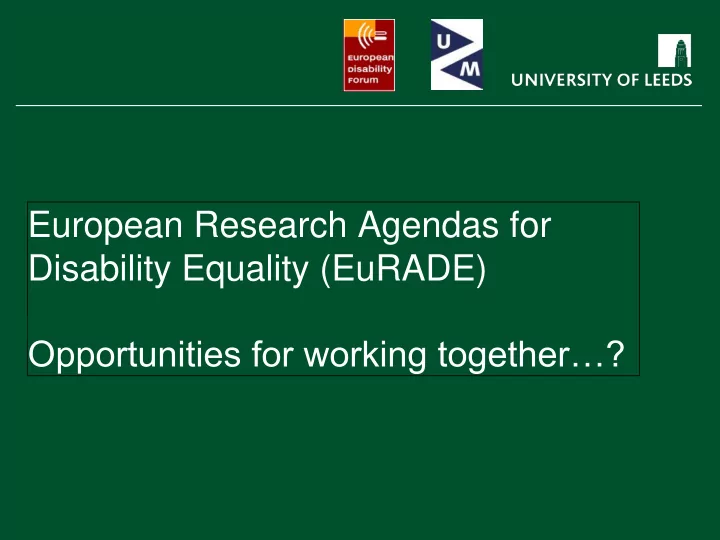

European Research Agendas for Disability Equality (EuRADE) Opportunities for working together…?
Aims and focus Identify and communicate the research priorities of disabled people’s 1. organisations in European civil society 2. Develop knowledge in civil society about research and in European countries 3. Initiate new research collaborations with European research teams within available funding opportunities
Activities • review current themes (EDF, DPI, EC, UN Convention, etc.) • consult EDF members (questionnaire) • disseminate priorities (civil society, researchers, policy makers) • research summer school (civil society and researchers) • observation at research conferences ('researching the researchers') • online training (research methods and knowledge) • identification of funding opportunities (FP7 and others) • initiation of research funding collaborations (matching and meeting)
Key arguments for collaborative research • Increased commitment of academic researchers to social and human rights models of disability • Increased social relevance of the academic research agenda • Increased opportunities for interdisciplinary research projects • Increased opportunities for dissemination and impact • Increased representation of disabled people in the ERA
Key arguments for collaborative research ‘Simply increasing participation and involvement will never by itself constitute emancipatory research unless and until it is disabled people themselves who are controlling the research and deciding who should be involved and how.’ Zarb (1992: 128):
Good news ‘In our country we work quite close together with universities; it is our experience researchers are very much willing to listen to the needs of [our] organisations. By informing researchers about what we want, we can help them find good topics for their research and they can help us by providing us information we would never have been able to get without them..’
Good news ‘ Disabled people's organisations have a better knowledge of what type of research is necessary and could bring about improvement in people's lives. At the same time, they often lack the capacity and skills to conduct research, which is why links with academic institutions are necessary.’
Good news ‘ The osmosis of the practical experience of the disability organizations and the theoretical approach of the academics can bring only positive results.’
Bad news ‘…few [academics] have understanding of the human rights, social model approach to disability, or have first hand experience of the problems disabled people face in their daily struggles, particularly in relation to accessibility, attitudes, participation in the community. Relevance could be increased if research questions were formulated from the human rights perspective, giving possibility to focus on barriers to participation or on risks of exclusion .’
Bad news ‘Research studies tend to be too theoretical and therefore miss the practical application. To use the advantages and to solve the problem of the missing applied relevance it is necessary to involve organisations of disabled people in the academic research right from the beginning and to work closely together with them.’
Researching the researchers ‘ Non-discrimination and human rights, bioethics and right to life were two areas identified in EuRADE consultation that in my opinion were not included in the conference topics with the exception of one presentation from one NGO- based research .’
Researching the researchers ‘I was expecting more of the human rights perspective, particularly the challenges of translating the principles of UN Convention on Rights of Persons with Disabilities (CRPD) into action at the national, regional level. Key issues affecting participation were discussed but only briefly.’
Learning Lessons ‘ They [academics] must be open to the ideas of disabled people and accept that the latter are the experts of disability issues. They must be ready to work with them as peers with different areas of expertise. This helps ensure that the research is relevant and can be used to bring about positive change in disabled people's lives .’
Researching the researchers ‘The important thing is to consult disabled people's organisations when deciding on research projects that will be conducted and also ensure that research results will be 'usable' by disabled people's organisations. Research should not be done just for the sake of research, but with a clear idea of how research results can contribute to improvement of disabled people's lives.’
Research roles for disabled people? • Research ‘subjects’ and participants • Project reference group • Consultants and advisors • Peer interviewers • Co-researchers • Academics • Project co-ordinators
The Survey Design • Framed by EDF priorities and policy document reviews • Online questionnaire (English and French, online and paper) • Presented at EDF Annual General Assembly (Slovenia, May 2008) • Presented at European Parliament (Brussels, January 2009) • Information, research experiences, priorities, motivation • Responses from 68 organisations in 25 countries • Mostly national or European level, and controlled by disabled people
The Survey Results • Strong interest in research (and experiences of collaboration) • Lack of resources for own research • Very positive about potential for academic collaborations... • ...BUT... Universities do not ‘understand research needs’ • Civil society have clear priorities and strong ideas (many ideas!)
The Research Priorities • First steps towards a user-led agenda for disability research in Europe?
The ‘Top 10’ priorities for DPOs? • Non-discrimination and human rights • Support for independent living • Education • Information and communication • Bioethics and rights to life • Health care • Mainstreaming disability in policies • Organisations of disabled people • Urban and built environments • Parenting and family life
Any Questions? Mark Priestley Centre for Disability Studies University of Leeds m.a.priestley@leeds.ac.uk www.leeds.ac.uk/disability-studies/projects/eurade
Recommend
More recommend